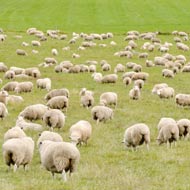Lynx project could be 'final straw'

"Conditions are tough in the sheep sector, returns are low and for some farmers the release of the lynx would be the final straw".
A project to reintroduce lynx to the UK could be the "final straw" for some sheep farmers, the National Sheep Association (NSA) has warned in a new report.
The Lynx UK Trust plans to apply for licences to release Eurasian lynx in England and/or Scotland later this year.
It believes the species will act as a valuable natural control of the UK's deer population, resulting in a regeneration of forests.
But the NSA's new report says the reintroduction could have a damaging impact on the country's sheep sector.
Chief executive Phil Stocker warns: "Around 75 per cent of biodiversity in the UK has a relationship with agriculture and, as a country, we have invested heavily in agri-environment schemes to enhance this.
"Grassland environments, which are considered to be an attractive and desirable part of our countryside, are largely managed by sheep farming.
"But conditions are tough in the sheep sector, returns are low and for some farmers the release of the lynx would be the final straw. We would lose much, much more than just sheep if these businesses cease to operate."
Sheep farmer and NSA Scottish region chairperson, Sybil Macpherson, said flocks that were removed from her area in Scotland have been recently brought back to overcome the impact of under-grazing on biodiversity.
"It is already difficult to maintain those vital sheep numbers due to predation by sea eagles, and I make a plea today to the powers that be for them to put more consideration into granting a licence to release the lynx than they did with the management of sea eagles," she added.
"Sea eagles have meant the end of profitability for many sheep farmers – add lynx to the equation and the land will become an unmanaged wilderness that is no use to man or beast, domesticated or wild."
Read the full report here: http://www.nationalsheep.org.uk/workspace/pdfs/nsa-report-on-the-wider-consequences-of-the-introduction-of-eurasian-lynx-to-the-uk.pdf



 The latest
The latest